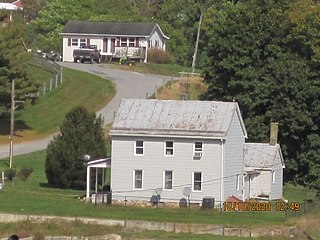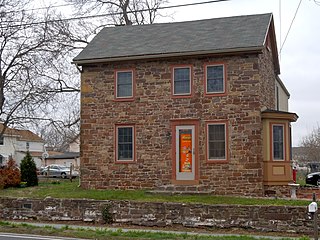
Chase is a town in Oconto County, Wisconsin The population was 2,082 at the time of the 2000 census. The unincorporated communities of Chase and South Chase are located in the town. The unincorporated community of Krakow is also located partially in the town. The town of Chase did have a post office that was established in 1890, until it was discontinued in 1907. The town was established in 1873 as St. Nathans. The name was changed to Chase in 1890. The Hillbert Settlement along Highway C was located in the town. Although the settlement was never an officially named place, it does show up on public documents. The settlement once had a cheese factory, multiple churches, and a cemetery. The only church that remains today is the Catholic Church. The settlement now is a small area along Highway C.

Trimborn Farm is a Victorian era estate located in Greendale, Wisconsin, United States, and owned by Milwaukee County. Spanning 7.5 acres and nine buildings, it is listed on the National Register of Historic Places. The farm is also a State Historic Site and designated Milwaukee County Landmark.

The Santanoni Preserve was once a private estate of approximately 13,000 acres (53 km2) in the Adirondack Mountains, and now is the property of the State of New York, at Newcomb, New York.

The John Scott Farm is a historic farmstead near the community of Shandon, Ohio, United States. Established in the nineteenth century and still in operation in the twenty-first, the farmstead has been named a historic site because of its traditionally built agricultural structures.
The Hood–Anderson Farm is a historic home and farm and national historic district located at Eagle Rock, Wake County, North Carolina, a suburb of the state capital Raleigh. The main house was built about 1839, and is an example of transitional Federal / Greek Revival style I-house. It is two stories with a low-pitched hip roof and a rear two-story, hipped-roof ell. The front facade features a large, one-story porch, built in 1917, supported by Tuscan order columns. Also on the property are the contributing combined general store and post office (1854), a one-room dwelling, a two-room tenant/slave house, a barn (1912), a smokehouse, and several other outbuildings and sites including a family cemetery.

The Willard-Fisk House is a historic farm property at 126 Whitney Street in Holden, Massachusetts. The farmhouse, built about 1772, is one of the oldest houses in Holden, and one of its oldest brick houses. The property also includes a 19th-century barn and several 20th-century farm outbuildings. The property was listed on the National Register of Historic Places in 1996, where it is listed at 121 Whitney Street.

The Drummine Farm is a historic home and farm complex located at New Market, Frederick County, Maryland, United States. The main house was constructed about 1790 and is a 2+1⁄2-story structure of uncoursed fieldstone. The house retains Georgian stylistic influences in exterior and interior decorative detailing. The farm complex structures include a stone tenant house dated 1816, and four additional fieldstone buildings from the early 19th century: a smokehouse, a water storage house, a garden outhouse, and a large bank barn. Wooden farm buildings include a calf shed and a wagon shed with corn cribs from the late 19th century, a dairy barn with three cement stave silos from the 1930s, several sheds and garages, and a large pole barn.
The Doub Farm is a historic home and farm located at Keedysville, Washington County, Maryland, United States. The house is a two-story, seven-bay brick structure set on low fieldstone foundations. The property includes a small brick wash house, a row of board-and-batten outbuildings, a large stone end bank barn, a frame corn crib and wagon shed, and lime kiln. The kiln is still in good condition with its circular lining of header bricks still intact.

The Benjamin Aldrich Homestead is a historic homestead east of the terminus of Aldrich Road, slightly east of Piper Hill in Colebrook, New Hampshire. Developed beginning in 1846, it is the oldest surviving farm property in the town. Its farmstead includes the original 1846 house and barns of the period. It was listed on the National Register of Historic Places in 2003, and the New Hampshire State Register of Historic Places in 2002.

The Evansburg Historic District in Evansburg, Pennsylvania, United States, is a National Historic District designated by Congress with over 50 National Register properties dating from the early 18th through 19th century. Almost all of these properties are privately owned and in active use at this time. The Evansburg Historic District was listed on the National Register of Historic Places in 1972.

The Butterfield Cobblestone House is on Bennett Corners Road in the Town of Clarendon, New York, United States, south of the village of Holley. It is a cobblestone structure from the mid-19th century built in the Greek Revival architectural style by a wealthy local farmer to house his large family. Three generations of his descendants would run the farm over the next 80 years. Later owners would make some renovations to the interior.

St. Mark's Episcopal Church, Guild Hall and Vicarage is a historic Episcopal church complex in Oconto, Wisconsin, with its buildings in architectural styles popular when they were constructed. The complex was added to the National Register of Historic Places on August 1, 1985 for its architectural significance.

The Mill Tract Farm, also known as the George Boone Homestead, is an historic, American house and farm complex that is located in Exeter Township, Berks County, Pennsylvania.

The Jacob Voigt House is a historic farm located in Mequon, Wisconsin, United States. It was added to the National Register of Historic Places in 2000.

The Squire Cheyney Farm is an historic, American farm and national historic district that is located in Thornbury Township, Chester County, Pennsylvania.

J. Mason Farm is a historic farm located near Ashland, New Castle County, Delaware. The property includes two contributing buildings. They are a stone house (1827) and a stone and frame bank barn. The house is a two-story, gable-roofed, fieldstone structure with a two-story, three-bay, frame wing that may have been added in the 1930s or 1940s. The barn walls are of uncoursed fieldstone finished with a pebbled stucco.

J. McIntyre Farm is a historic farm located near Newark, New Castle County, Delaware. The property includes five contributing buildings. They are a stuccoed brick house with frame Gothic Revival style additions, a stone bank barn, and three late 19th century outbuildings: a braced frame corn crib, a braced frame machine shed, and a two-story granary covered with corrugated metal siding. The house is a two-story, three-bay, brick building with an added central cross-gable, and a frame wing extending from its west endwall. The barn walls are constructed of large, dark fieldstones with large, rectangular quoins, and in places is covered with a pebbled stucco.

The Jacob and Rebecca Fuerst Farmstead was a farm located at 24000 Taft Road in Novi, Michigan. It was listed on the National Register of Historic Places in 1997. The farm was demolished in 2008 and the property redeveloped into Fuerst Park.

The Daniel Pond Farmhouse, also known as Eggleston Farm, is a limestone-walled home built in Rutland, Wisconsin in the 1840s. In 1980 the house was listed on the National Register of Historic Places.



















